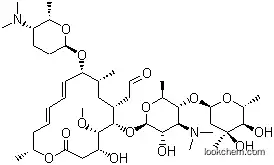8025-81-8
Post Buying Request-
-
Basic information
- Product Name: Spiramycin
- Synonyms: SPIRAMYCIN;rovamycin;provamycin;FORMACIDINE;foromacidin;LEUCOMYCIN;KITASAMYCIN BASE;5337r.p.
- CAS NO:8025-81-8
- Molecular Formula: C134H228N6O44
- Molecular Weight: 2627.25792
- EINECS: 232-429-6
- Product Categories: Miscellaneous Natural Products;Antibacterial;Antibiotics for Research and Experimental Use;Biochemistry;Macrolides (Antibiotics for Research and Experimental Use);Macrolides;MacrolidesAntibiotics;MLSAlphabetic;SN - SZMore...Close...;Antibiotics;Antibiotics A to;Antibiotics N-SAntibiotics;BactericidalAntibiotics;Chemical Structure;Chemical Structure Class;Interferes with Protein SynthesisSpectrum of Activity;L - ZAntibiotics;Mechanism of Action;Principle;S;Peptide Synthesis/Antibiotics;Inhibitors;Pharmaceutical intermediates
- Mol File: 8025-81-8.mol
- Article Data: 0
-
Chemical Properties
- Melting Point: 126-128 °C
- Boiling Point: 914℃
- Flash Point: >110°(230°F)
- Appearance: white to light yellow/
- Density: 1.217 g/cm3
- Vapor Pressure: 0mmHg at 25°C
- Refractive Index: 81 ° (C=2, 10% AcOH)
- Storage Temp.: 2-8°C
- Solubility: ethanol: 50 mg/mL, clear to slightly hazy, light-yellow
- Water Solubility: Soluble in methanol. Slightly soluble in water
- Merck: 14,8752
- CAS DataBase Reference: Spiramycin(CAS DataBase Reference)
- NIST Chemistry Reference: Spiramycin(8025-81-8)
- EPA Substance Registry System: Spiramycin(8025-81-8)
-
Safety Data
- Hazard Codes: Xi
- Statements: 36/37/38
- Safety Statements: 26-36-24/25
- WGK Germany: 1
- RTECS: WG9400000
- F: 10
- HazardClass: N/A
- PackingGroup: N/A
- Hazardous Substances Data: 8025-81-8(Hazardous Substances Data)
8025-81-8 Suppliers
Recommended suppliersmore
8025-81-8 Usage
Description
Spiramycin is a complex of 16-membered macrocyclic lactones produced by Streptomyces ambofaciens and Streptomyces spiramyceticus. It is a broad-spectrum antibiotic with unique characteristics, including the presence of two basic sugars. Spiramycin has been utilized in both human and animal health, although its application has not been as widespread as other antibiotics.Uses
Used in Pharmaceutical Industry:Spiramycin is used as an antibacterial agent for treating various bacterial infections due to its broad-spectrum antibiotic activity.
Used in Nutritional Supplements:
Spiramycin is used as a source of vitamin A, contributing to the maintenance of good health and supporting the immune system.
Used in Veterinary Medicine:
Spiramycin is used as a broad-spectrum antibiotic for treating bacterial infections in animals, ensuring their health and well-being.
Used in Research and Development:
Spiramycin I (foromacidin A) is the major analogue of the Spiramycin complex, which has been studied for its unique properties and potential applications in the development of new antibiotics and pharmaceuticals.
Originator
Rovamycine,Specia,France,1972Manufacturing Process
The process for producing spiramycin comprises inoculating an aqueous nutrient medium with a culture of the NRRL No. 2420, allowing aerobic fermentation to take place and separating from the culture medium the spiramycin thus formed. The culture medium also contains the antibiotic substance known as Congocidin which, however, does not possess the same useful properties as spiramycin and which can be isolated in crystalline form. The separation of the two antibiotic substances is readily achieved.Therapeutic Function
AntibacterialAntimicrobial activity
Enterobacteriaceae are resistant. Spiramycin is also active against anaerobic species: Actinomyces israelii (MIC 2–4 mg/L), Cl. perfringens (MIC 2–8 mg/L) and Bacteroides spp. (MIC 4–14 mg/L). It is also active against Tox. gondii.Hazard
Poison; moderately toxic; teratogen; muta- gen; can cause hypermotility, diarrhea, nausea, or vomiting.Pharmaceutical Applications
A fermentation product of Streptomyces ambofaciens, composed of several closely related compounds. Spiramycin 1 is the major component (c. 63%); spiramycins 2 and 3 are the acetate and monopropionate esters, respectively. It is available for oral administration and as spiramycin adipate for intravenous infusion. Spiramycins are relatively stable in acid conditions. A derivative, acetylspiramycin, is available in Japan.Pharmacokinetics
Oral absorption: Variable Cmax 1 g oral: 2.8 mg/L after 2 h Plasma half-life:4–8h Volume of distribution :383 LPlasma protein binding :15%In healthy volunteers given 2 g orally followed by 1 g every 6 h, peak plasma levels were 1.0–6.7 mg/L. After 1 g orally the AUC was 10.8 mg.h/L, with an apparent elimination halflife of 2.8 h. It is widely distributed in the tissues. It does not reach the CSF. Levels 12 h after a dose of 1 g were 0.25 mg/L in serum, 5.3 mg/L in bone and 6.9 mg/L in pus. Levels of 10.6 mg/L have been found 4 h after dosing in saliva, and concentrations at least equal to those in the serum are seen in bronchial secretions. A concentration of 27 mg/g was found in prostate tissues after repeated dosage. Only 5–15% is recovered from the urine. Most is metabolized, but significant quantities are eliminated via the bile, in which concentrations up to 40 times those in the serum may be found.Side effects
Spiramycin is generally well tolerated, the most common adverse reactions being gastrointestinal disturbances, notably abdominal pain, nausea and vomiting, rashes and sensitization following contact.Check Digit Verification of cas no
The CAS Registry Mumber 8025-81-8 includes 7 digits separated into 3 groups by hyphens. The first part of the number,starting from the left, has 4 digits, 8,0,2 and 5 respectively; the second part has 2 digits, 8 and 1 respectively.Calculate Digit Verification of CAS Registry Number 8025-81:
(6*8)+(5*0)+(4*2)+(3*5)+(2*8)+(1*1)=88
88 % 10 = 8
So 8025-81-8 is a valid CAS Registry Number.
InChI:InChI=1/C43H74N2O14/c1-24-21-29(19-20-46)39(59-42-37(49)36(45(9)10)38(27(4)56-42)58-35-23-43(6,51)41(50)28(5)55-35)40(52-11)31(47)22-33(48)53-25(2)15-13-12-14-16-32(24)57-34-18-17-30(44(7)8)26(3)54-34/h12-14,16,20,24-32,34-42,47,49-51H,15,17-19,21-23H2,1-11H3/b13-12+,16-14+/t24-,25-,26?,27?,28?,29+,30?,31-,32+,34?,35?,36?,37?,38?,39+,40+,41?,42?,43?/m1/s1


